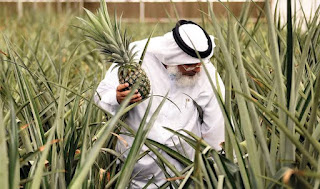UAE’s Measures to Mitigate Drought Risks and Enhance Food Security
In recent years, the global challenge of climate change has intensified the need for proactive measures to combat environmental risks and ensure food security. The United Arab Emirates (UAE), a nation situated in one of the most arid regions of the world, has recognized the urgent need to address these issues. In response, the UAE has implemented a series of innovative strategies aimed at mitigating the risks of drought and enhancing food security for its population.
Addressing the Drought Challenge
The UAE faces significant challenges due to its arid climate and limited freshwater resources. To combat the risks posed by drought, the country has adopted a multi-faceted approach that leverages technology, sustainable practices, and strategic planning.
1. Advanced Water Management Systems: The UAE has invested heavily in state-of-the-art water management technologies. This includes the development of sophisticated desalination plants that convert seawater into potable water. Additionally, the country is implementing advanced irrigation techniques such as drip and sprinkler irrigation, which significantly reduce water wastage in agriculture.
2. Cloud Seeding Programs: To enhance rainfall, the UAE has been utilizing cloud seeding technology. This involves dispersing substances into the atmosphere to encourage cloud formation and precipitation. These efforts have shown promising results in increasing rainfall, which is crucial for replenishing groundwater reserves and supporting agriculture.
3. Efficient Water Usage Policies: The government has introduced policies aimed at promoting water conservation. These include public awareness campaigns, incentives for water-saving technologies, and regulations to minimize water usage in industrial and residential sectors.
Enhancing Food Security
Ensuring a stable and secure food supply is a top priority for the UAE. To achieve this, the country is implementing a variety of measures designed to enhance agricultural productivity, diversify food sources, and create a resilient food supply chain.
1. Investment in Agricultural Technology: The UAE is embracing agricultural innovation through the use of vertical farming, hydroponics, and aquaponics. These technologies allow for the cultivation of crops in controlled environments, reducing the dependency on traditional farming methods that are vulnerable to climate change.
2. Research and Development: The UAE is investing in research to develop drought-resistant crop varieties and sustainable farming practices. Collaboration with international agricultural research centers is helping the country adopt best practices and innovative solutions to improve crop yields.
3. Diversification of Food Sources: To reduce reliance on food imports, the UAE is encouraging the production of a wider variety of crops within the country. This includes the cultivation of high-value crops and the development of aquaculture to increase local fish production.
4. Strategic Food Reserves: The UAE has established strategic food reserves to ensure an adequate supply of essential food items in times of crisis. These reserves act as a buffer against supply chain disruptions and global market volatility.
Sustainable Practices and International Collaboration
Sustainability is at the core of the UAE’s approach to mitigating drought risks and enhancing food security. The country is committed to reducing its environmental footprint through the adoption of renewable energy sources and sustainable agricultural practices.
1. Renewable Energy in Agriculture: The UAE is integrating renewable energy sources, such as solar power, into agricultural operations. This not only reduces the carbon footprint but also lowers the cost of energy-intensive processes like desalination and irrigation.
2. International Partnerships: The UAE is actively engaging with international organizations and other countries to share knowledge and collaborate on sustainable agricultural practices. These partnerships are essential for addressing global challenges and finding innovative solutions to food security issues.

Comments
Post a Comment